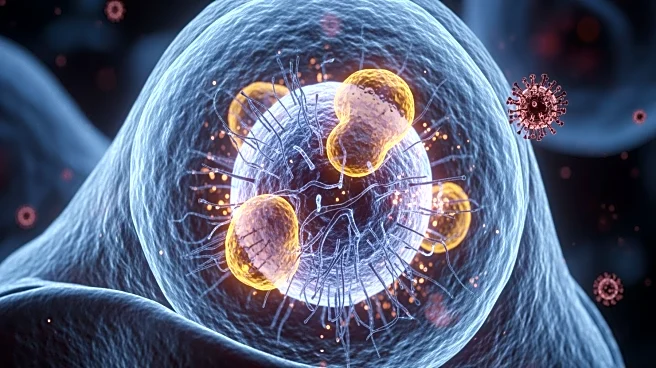What is the story about?
What's Happening?
Recent research has highlighted the potential of targeting SREBP-dependent lipogenesis to enhance the anti-tumor activity of docetaxel, a chemotherapy drug. The study involved treating prostate cancer cells with docetaxel and FGH10019, a compound that inhibits lipogenesis. The combination treatment increased membrane permeability and intracellular drug accumulation, leading to improved efficacy of docetaxel. The research utilized various methodologies, including FRAP analyses to assess membrane fluidity and lipidomics to measure drug uptake. The findings suggest that inhibiting lipogenesis can potentiate the effects of chemotherapy by altering cellular membrane properties, thereby increasing drug retention and effectiveness.
Why It's Important?
This research is significant as it offers a potential strategy to improve the effectiveness of chemotherapy treatments for cancer patients. By targeting lipogenesis, the study provides insights into how cellular mechanisms can be manipulated to enhance drug delivery and efficacy. This could lead to more effective treatment protocols, reducing the required dosage of chemotherapy drugs and minimizing side effects. The findings may influence future cancer treatment strategies, potentially benefiting patients with resistant or aggressive forms of cancer by offering a new avenue for therapeutic intervention.
What's Next?
Further research is needed to validate these findings in clinical settings and explore the broader applicability of lipogenesis inhibition in other types of cancer. Clinical trials could be initiated to test the safety and efficacy of combining docetaxel with lipogenesis inhibitors in human patients. Additionally, researchers may investigate other compounds that target lipogenesis, aiming to develop new drugs that can be used in combination with existing chemotherapy treatments. The study opens up possibilities for personalized medicine approaches, tailoring treatments based on individual cellular characteristics.
Beyond the Headlines
The study raises ethical considerations regarding the development and testing of new cancer treatments. Ensuring equitable access to advanced therapies and addressing potential disparities in treatment availability are important factors to consider. Additionally, the research highlights the importance of understanding cellular mechanisms in drug development, which could lead to long-term shifts in how cancer therapies are designed and implemented.














